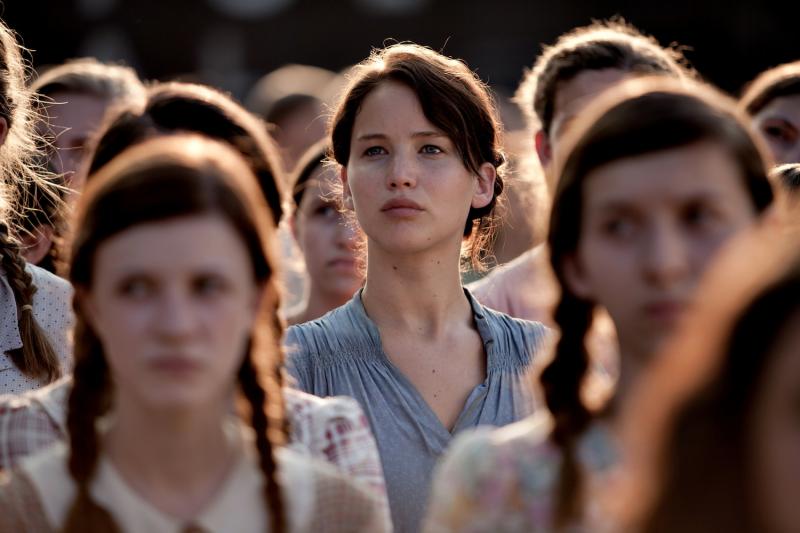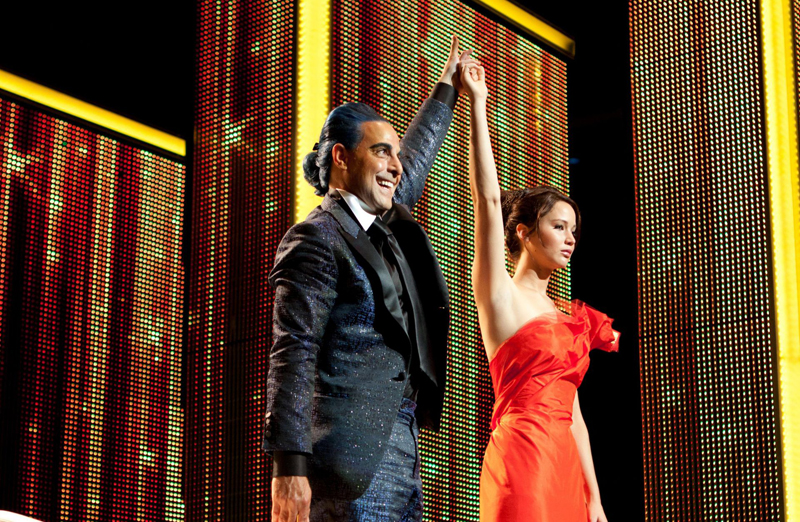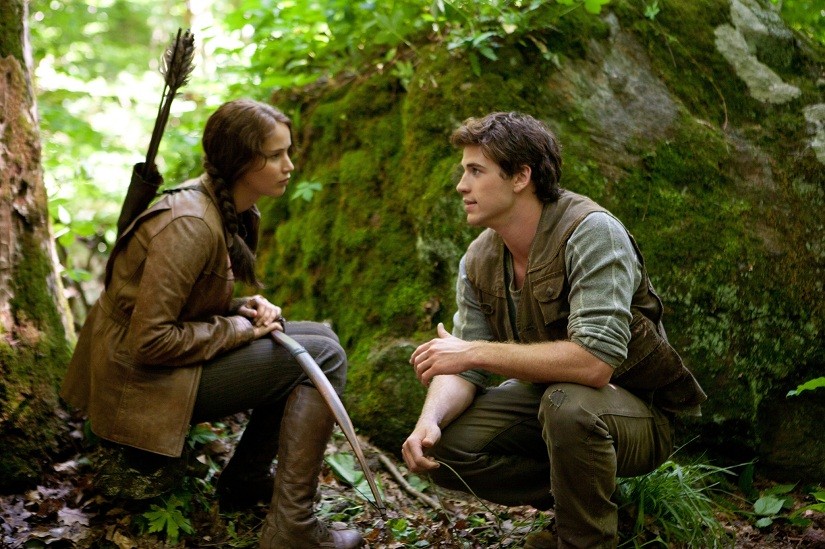The Hunger Games | reviews, news & interviews
The Hunger Games
The Hunger Games
Compelling adaptation of Suzanne Collins's dystopian teen drama is emphatically not about young love

Given the numerous and now pretty tiresome comparisons that pundits and punters alike have drawn between the Hunger Games trilogy and the inexorable Twilight saga, it’s worth taking a moment to imagine how the franchises’ respective heroines might get on if they actually met. One can’t imagine they’d see eye to eye on much.
The Hunger Games’ fiercely self-reliant Katniss Everdeen is a 16-year-old with the weight of a broken world on her stoical shoulders, fighting tooth and nail to protect her family from starvation and violent oppression. Twilight’s meek, passively dependent Bella Swan is a 16-year-old preoccupied solely with the question of which man she should devote her life to. In all likelihood, their meeting would end with Bella getting an arrow through the eye.
Her father dead, her mother lost in near-catatonic depression, Katniss – played here with earthy nuance by Jennifer Lawrence – has learned to hunt and barter to put food on her family’s table. It’s a challenging prospect in the dystopian surroundings of Panem, a country that was once North America but now consists of 12 districts ruled over by a despotic Capitol. The eponymous Games are an annual event in which one boy and one girl from each district are randomly selected to compete in a battle to the death, televised in the style of a reality show. If you’re wondering where you’ve seen this premise before, try brash Japanese shocker Battle Royale or the blackly satirical Series 7: The Contenders. When her beloved younger sister Prim is selected for the Games at the none-too-reassuringly named Reaping ceremony, Katniss volunteers to take her place.
 Director Gary Ross (incongruously best known for the sugar-coated Seabiscuit) and his director of photography Tom Stern (Clint Eastwood’s regular DoP for the past decade) establish a shrewd visual contrast between the muted blues and greys of District 12, where Katniss leads a hand-to-mouth existence, and the garish neons of the television studio into which she’s later thrust. Each contestant is primped and styled for the cameras, expected to charm the crowd in a talk-show interview before being led to the slaughter. “It’s a very interesting mix this year,” muses host Caesar Flickerman (Stanley Tucci), a piece of pre-game analysis exemplifying the film’s dead-on portrayal of the dynamics of reality television.
Director Gary Ross (incongruously best known for the sugar-coated Seabiscuit) and his director of photography Tom Stern (Clint Eastwood’s regular DoP for the past decade) establish a shrewd visual contrast between the muted blues and greys of District 12, where Katniss leads a hand-to-mouth existence, and the garish neons of the television studio into which she’s later thrust. Each contestant is primped and styled for the cameras, expected to charm the crowd in a talk-show interview before being led to the slaughter. “It’s a very interesting mix this year,” muses host Caesar Flickerman (Stanley Tucci), a piece of pre-game analysis exemplifying the film’s dead-on portrayal of the dynamics of reality television.
That said, there are political resonances that don’t survive the page-to-screen translation. One of author Suzanne Collins’s most potent and disturbingly plausible ideas is barely mentioned here – that of the “tesserae”, a system by which poorer citizens can choose to have their name entered into the Hunger Games ballot more times, thus increasing their chances of being picked, in exchange for extra food.
While the contestants' training period is given a pleasing amount of scope here, the trade-off is that the Games themselves feel curiously rushed and even anticlimactic. This comes down to a simple problem of establishing the passage of time – much of the book follows Katniss alone for days in the densely forested arena, staving off dehydration and hunting for food. It’s hard to imagine how these portions could compel on screen, but without them there’s less sense of sheer endurance, and thus one or two of Katniss’s later lucky escapes feel less earned.
There’s also an expanded sense here of the world beyond the arena, and hints of the political unrest that will become crucial in later instalments. Where Collins’s prose stays tethered to Katniss’s point of view, the script moves between her and the sinister forces controlling the Games in a way that’s reminiscent of Drew Goddard and Joss Whedon’s upcoming The Cabin in the Woods. Without wishing to spoil that film, the two would make a compelling double bill.
 And then, of course, there is the love triangle. As deftly as Lawrence conveys every note on the emotional scale from deadened terror to helpless fury, there’s a curious lack of spark with either childhood friend Gale (Liam Hemsworth) or lovelorn fellow contestant Peeta (Josh Hutcherson). But this seems almost to be by design in a film whose view of romance is cynical at best. As directed by mentor Haymitch (an enjoyably sardonic Woody Harrelson), Katniss pretends to return Peeta’s feelings for her in order to curry favour with viewers, knowing that young love will “give them something to root for”. Team Peeta? Team Gale? Who cares? In a world this bleak and desperate, there’s no room for heroines in the Bella Swan mould.
And then, of course, there is the love triangle. As deftly as Lawrence conveys every note on the emotional scale from deadened terror to helpless fury, there’s a curious lack of spark with either childhood friend Gale (Liam Hemsworth) or lovelorn fellow contestant Peeta (Josh Hutcherson). But this seems almost to be by design in a film whose view of romance is cynical at best. As directed by mentor Haymitch (an enjoyably sardonic Woody Harrelson), Katniss pretends to return Peeta’s feelings for her in order to curry favour with viewers, knowing that young love will “give them something to root for”. Team Peeta? Team Gale? Who cares? In a world this bleak and desperate, there’s no room for heroines in the Bella Swan mould.
This is explicitly not a film about young love, or being torn between boyfriends. It’s about family and terror and loss. It’s about being brave, and being alone, and having to grow up too soon. It’s about one young woman who is strong and smart and single-minded enough to overcome the odds. In other words: if you must pick a team, make it Team Katniss.
- The Hunger Games is on UK release from Friday, 23 March
rating
Explore topics
Share this article
The future of Arts Journalism
You can stop theartsdesk.com closing!
We urgently need financing to survive. Our fundraising drive has thus far raised £49,000 but we need to reach £100,000 or we will be forced to close. Please contribute here: https://gofund.me/c3f6033d
And if you can forward this information to anyone who might assist, we’d be grateful.

Subscribe to theartsdesk.com
Thank you for continuing to read our work on theartsdesk.com. For unlimited access to every article in its entirety, including our archive of more than 15,000 pieces, we're asking for £5 per month or £40 per year. We feel it's a very good deal, and hope you do too.
To take a subscription now simply click here.
And if you're looking for that extra gift for a friend or family member, why not treat them to a theartsdesk.com gift subscription?
more Film
 theartsdesk Q&A: filmmaker Dag Johan Haugerud on sex, love, and confusion in the modern world
The writer-director discusses first-love agony and ecstasy in 'Dreams', the opening UK installment of his 'Oslo Stories' trilogy
theartsdesk Q&A: filmmaker Dag Johan Haugerud on sex, love, and confusion in the modern world
The writer-director discusses first-love agony and ecstasy in 'Dreams', the opening UK installment of his 'Oslo Stories' trilogy
 Blu-ray: Two Way Stretch / Heavens Above
'Peak Sellers': two gems from a great comic actor in his prime
Blu-ray: Two Way Stretch / Heavens Above
'Peak Sellers': two gems from a great comic actor in his prime
 Late Shift review - life and death in an understaffed Swiss hospital
Petra Volpe directs Leonie Benesch in a compelling medical drama
Late Shift review - life and death in an understaffed Swiss hospital
Petra Volpe directs Leonie Benesch in a compelling medical drama
 The Naked Gun review - farce, slapstick and crass stupidity
Pamela Anderson and Liam Neeson put a retro spin on the Police Squad files
The Naked Gun review - farce, slapstick and crass stupidity
Pamela Anderson and Liam Neeson put a retro spin on the Police Squad files
 theartsdesk Q&A: actor Lars Eidinger on 'Dying' and loving the second half of life
The German star talks about playing the director's alter ego in a tormented family drama
theartsdesk Q&A: actor Lars Eidinger on 'Dying' and loving the second half of life
The German star talks about playing the director's alter ego in a tormented family drama
 The Fantastic Four: First Steps review - innocence regained
Marvel's original super-group return to fun, idealistic first principles
The Fantastic Four: First Steps review - innocence regained
Marvel's original super-group return to fun, idealistic first principles
 Dying review - they fuck you up, your mum and dad
Family dysfunction is at the heart of a quietly mesmerising German drama
Dying review - they fuck you up, your mum and dad
Family dysfunction is at the heart of a quietly mesmerising German drama
 theartsdesk Q&A: director Athina Rachel Tsangari on her brooding new film 'Harvest'
The Greek filmmaker talks about adapting Jim Crace's novel and putting the mercurial Caleb Landry Jones centre stage
theartsdesk Q&A: director Athina Rachel Tsangari on her brooding new film 'Harvest'
The Greek filmmaker talks about adapting Jim Crace's novel and putting the mercurial Caleb Landry Jones centre stage
 Blu-ray: The Rebel / The Punch and Judy Man
Tony Hancock's two film outings, newly remastered
Blu-ray: The Rebel / The Punch and Judy Man
Tony Hancock's two film outings, newly remastered
 The Ballad of Suzanne Césaire review - a mysterious silence
A black Caribbean Surrealist rebel obliquely remembered
The Ballad of Suzanne Césaire review - a mysterious silence
A black Caribbean Surrealist rebel obliquely remembered
 Harvest review - blood, barley and adaptation
An incandescent novel struggles to light up the screen
Harvest review - blood, barley and adaptation
An incandescent novel struggles to light up the screen
 Friendship review - toxic buddy alert
Dark comedy stars Tim Robinson as a social misfit with cringe benefits
Friendship review - toxic buddy alert
Dark comedy stars Tim Robinson as a social misfit with cringe benefits

Add comment